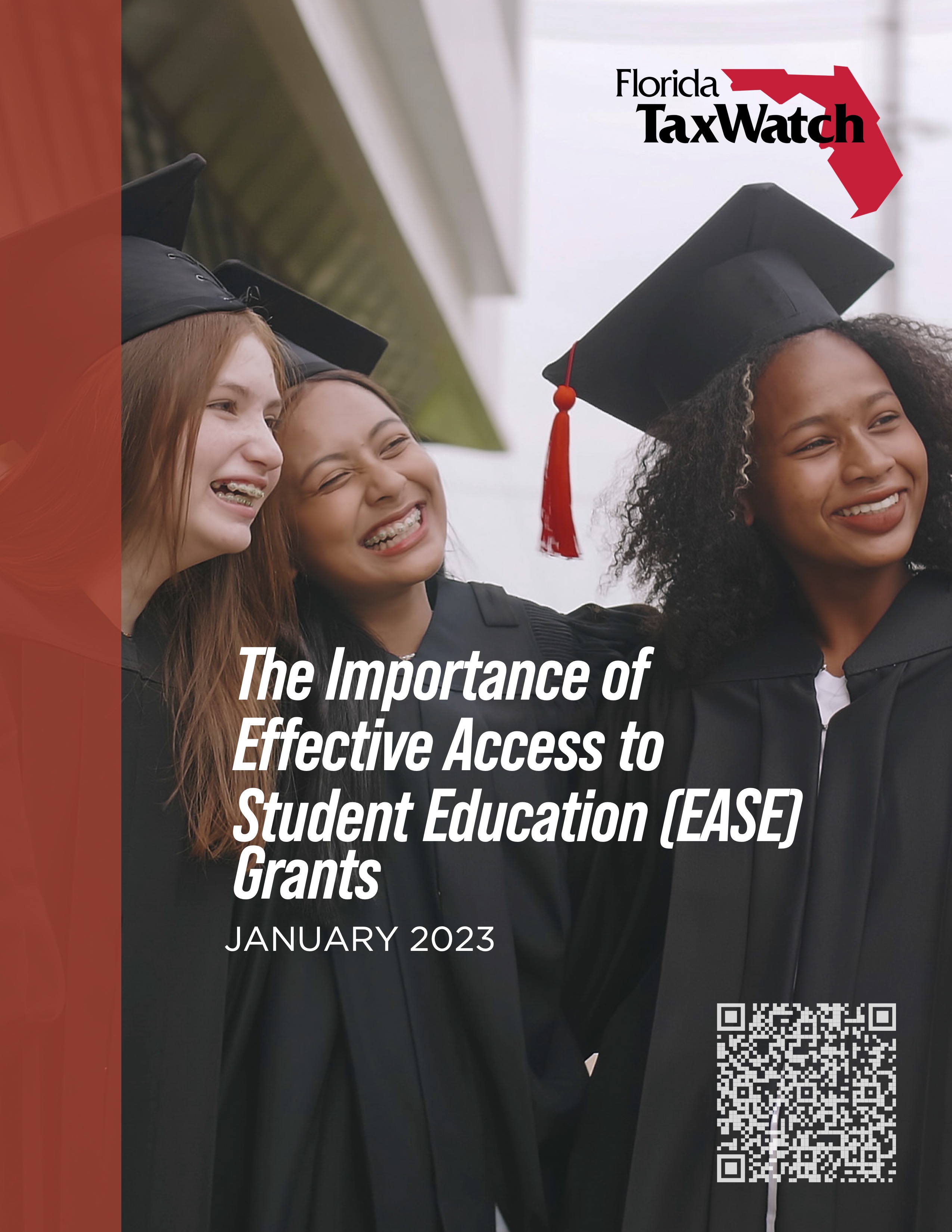The Importance of Effective Access to Student Education (EASE) Grants
 Florida’s Effective Access to Student Education (EASE) grants provide modest tuition equalization to reduce the difference between public and private tuition; make private institutions more affordable to Florida residents; fuel enrollment growth; increase retention and degree completions in Florida; and reduce the tax burden on Florida taxpayers.
Florida’s Effective Access to Student Education (EASE) grants provide modest tuition equalization to reduce the difference between public and private tuition; make private institutions more affordable to Florida residents; fuel enrollment growth; increase retention and degree completions in Florida; and reduce the tax burden on Florida taxpayers.
The maximum EASE grant funding per student and the maximum number of students to be served annually are determined by the Florida Legislature. For the 2022-23 fiscal year, the legislature appropriated $75.41 million to support 37,705 qualified Florida resident students at $2,000 per student for tuition assistance. The maximum per student EASE grant appropriation for fiscal year 2022-23 ($2,000) is the lowest since the start of the millennium. The $2,000 maximum per student appropriation for fiscal year 2022-23 represents a 29.6 percent reduction from the maximum appropriated for fiscal year 2021-22. The maximum number of students to receive EASE grants for fiscal year 2022-23 (37,705) is the lowest since fiscal year 2013-14. This represents an 8.2 percent reduction from the maximum number of students to receive EASE grants for fiscal year 2021-22.
The fiscal and economic impacts of the EASE Grant Program are well-documented. A 2022 study by the Regional Economic Consulting (REC) Group found that the fiscal year 2019-20 EASE Grant Program created 21,934 jobs and added $1.4 billion of labor income. It also added $2.3 billion to the Gross Domestic Product and produced $3.5 billion in economic output. The EASE Grant Program generated $136.2 million in state and $146.1 million in local tax revenues. This represents $88,132 of economic contribution per EASE Grant recipient. Every $1 invested by the state generates a return of $2.48 in tax revenues.
The 2022 Florida legislature considered a bill (CS/HB 5201) that would establish a tiered structure for EASE Grant award amounts commensurate with an institution’s performance against established benchmarks. Institutions that met one or none of the benchmarks would be placed in the lowest tier and would receive $0 in EASE grants, denying needed tuition assistance to 2,270 eligible students. Although CS/HB 5201 was passed by the House, the Senate failed to pass the bill. As a result, the General Appropriations Act included $75.41 million to support 37,705 eligible EASE Grant recipients at $2,000 per student. This represents a reduction of $39.45 million (34 percent) in program funding and 2,725 fewer EASE Grant recipients, as compared to fiscal year 2021-22.
Those who do receive EASE Grants in fiscal year 2022-23 will receive $841 less in tuition assistance compared to fiscal year 2021-22. Using the REC Group’s estimate of $88,132 of economic contribution per EASE Grant recipient, 2,725 fewer EASE Grant recipients will save the state $39.45 million, but the impact on Florida’s economy would be more than $240 million.
Legislators looking to penalize those private colleges and universities that fail to meet established benchmarks by withholding EASE grant tuition assistance to eligible students should heed the experience of the State University System of Florida (SUS). During the 2014-15 academic year, the SUS unveiled its performance-based funding model.
The initial SUS model applied 10 metrics for each of the 12 SUS institutions. A 50-point scoring system was established, and an institution had to score at least 26 points to receive any of the $50 million in performance funding requested from the legislature. The three institutions with the lowest scores not only received no performance incentive funds, but they had their base funding reduced by one percent. Even universities that received the performance incentive funds expressed concern that the lowest scoring universities would stay at or near the bottom, year after year. In 2018, the SUS revised the performance incentive model to eliminate the penalty for the bottom three institutions.
The legislature has acknowledged that a strong and viable system of independent nonprofit colleges and universities reduces the tax burden on the residents of the state. Without this tuition assistance program, many Floridians would not be able to attend a
private college or university.
Florida TaxWatch supports increasing the state’s investment in the EASE Grant Program to help increase access to higher education. The state should take no action that limits access to higher education. Florida TaxWatch is a firm believer in government transparency and accountability and supports the establishment of a performance-based incentive funding program for private colleges and universities that receive EASE Grant tuition assistance, similar to the current performance-based incentive funding program used by the SUS.